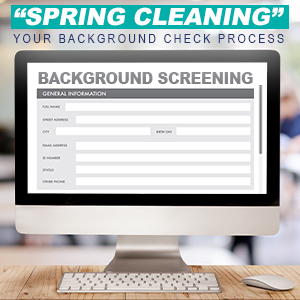
By Susan Chance, courtesy SBAM Approved Partner ASE
It’s hard to tell by the weather we had last week, but it is spring. Spring is that time of year when we start to see that change from everything being gray and dirty, to becoming green and colorful with the flowers that start to grow. It is also time for spring cleaning. Most people think of giving their home a thorough cleaning, putting the winter accoutrements away, and generally getting things in order for the new season. But when is the last time you gave your background process a good spring cleaning?
Laws and regulations regarding background checking constantly change, and the results of lawsuits all bring about changes in requirements.
Disclosure Forms
If you haven’t dusted off your forms for a review lately, you should start your spring cleaning here. Disclosure forms must be stand-alone documents with no extraneous information. Did you know that even state notices are considered extraneous information on Disclosure forms?
The Ninth Circuit Court of Appeals recently ruled that the disclosure form required by the Fair Credit Reporting Act (FCRA) cannot contain disclosures required by other state laws in the disclosure document. Doing so can make the form and information confusing thereby failing the clear part of the “clear and conspicuous” requirement for the form.
Services
When is the last time you looked at the services included in your background checks? Perhaps it’s time to shine your process up by making sure you are getting the coverage you need without duplicating efforts.
More and more businesses are checking Sex Offender Registries as part of their process out of concern for their employees as well as the employees at client sites. Sex Offender registries are separate from public record databases (criminal records, ordinance violations, etc.). While sexual assault arrests and convictions may show up on state and county records, sex offender registries will not. If your business makes that information important to your background checking process, you should make sure you have that check included in your process.
The National Criminal Database includes the Sex Offender Registries for all 50 states, so if you are running both a National Check and a Sex Offender Registry check you may be wasting resources. There are a few businesses that must show the Sex Offender check as a stand-alone item for compliance purposes, but most businesses do not have that requirement. Confirm what your business requirements are, then you can make updates as needed.
Are you running the same check for all employees? That may not be the best practice. There are some checks, such as credit checks and motor vehicle records checks, that you may not want to run for everyone. Some states prohibit credit checks unless there is a bona fide occupational qualification for the check. If you are hiring a CFO, a credit check would be prudent, but is it necessary if you are hiring a receptionist?
You can have different background check standards by position, just make sure you are treating everyone within that classification the same.
What about driving checks? It is a best practice to run driving record checks on any employees who will drive for work. It does not matter if they are driving their own car, a company car, or a rental, if they are driving on business there is risk for the company. It is also a good idea to run the check periodically. Just because someone had a clear record when they were hired, doesn’t guarantee their record will still be clean a year or two down the road.
These are just a few examples of you can spring clean your background check process. Background checking is a constantly evolving business. Do some spring cleaning to make sure you are keeping up with the changes.